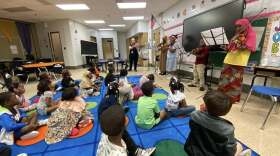Lawmakers say they’ve been fielding lots of questions from teachers — including whether their presence at the Capitol has made any difference.
“I’ve spoken with hundreds of teachers over the past few weeks, and every one of them has been deeply conflicted about whether or not to be here, because they’re teachers first,” said Louisville Representative, and former JCPS board member, Lisa Willner.
Willner said she personally thinks the teachers’ activism has made a difference. Her fellow Democratic representative Charles Booker agrees.
“It makes all the difference. In any sphere, person to person contact, you just can’t replace it,” Booker said.
Louisville Republican Representative Jason Nemes said it’s been helpful to talk to teachers in person, but he questions the strategy of staging district-wide sickouts.
“I think coming to Frankfort, en masse, and just being here, I don’t think it’s made any effect at all," Nemes said. "I do think the communication with legislators has been the important part.”
Nemes said he’s received emails and calls from many teachers whose concerns included their opposition to ongoing school closings.
Teachers certainly haven’t all agreed about the sickout strategy, but hundreds have voiced their opposition — in one way or another — to three specific bills.
The first sickout day, in which 10 districts closed, teachers stormed the Capitol to oppose House Bill 525. That bill would have changed the makeup of the board that manages teachers’ pensions. A committee passed a revised version of the bill that day, but it never moved forward again.
House Bill 205 — which would have created a significant tax credit for donations to groups that give private school scholarships — stirred further controversy and continued JCPS sickouts. That bill also stalled out in recent weeks.
"The fact that House Bill 525 and House Bill 205 did not pass this session, that they kind of quietly whimpered away, I think is directly attributable to the teacher presence," Willner said.
Booker agrees. He cites the lack of movement on the scholarship tax credits, which critics said could drain funding from public schools.
"When we started this session, there were talks from the Republican side that they would be able to move that quickly," Booker said.
On the final day of the session, the scholarship tax credit bill had not moved in more than a week, and died quietly. Republican Representative Nemes said the bill simply did not have the votes to pass — especially not in this non-budget year when more votes are required to pass bills that affect next year’s budget.
"Those votes weren’t there in December, and so they’re still not there today," Nemes said.
Nemes thinks teacher feedback made no difference on that bill, but said it did have an effect on a third bill protesters opposed.
"We had Senate Bill 250, that was about the superintendent’s ability to hire principals, that was changed because of a lot of teacher input," Nemes said.
That bill, now law, gives the JCPS superintendent final say in hiring principals, but keeps school councils in the process, a revision since the bill's original filing.
Willner, Booker and Nemes all say they hope Jefferson County teachers will stay engaged — and in touch — into the 2020 legislative session.







